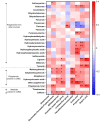Long-Term Coffee Consumption is Associated with Fecal Microbial Composition in Humans
- PMID: 32369976
- PMCID: PMC7282261
- DOI: 10.3390/nu12051287
Long-Term Coffee Consumption is Associated with Fecal Microbial Composition in Humans
Abstract
Coffee consumption has been related to a preventive effect against several non-transmissible pathologies. Due to the content of this beverage in phytochemicals and minerals, it has been proposed that its impact on health may partly depend on gut microbiota modulation. Our aim was to explore the interaction among gut microbiota, fecal short chain fatty acids, and health-related parameters in 147 healthy subjects classified according to coffee consumption, to deepen the association of the role of the (poly)phenol and alkaloid content of this beverage. Food daily intake was assessed by an annual food frequency questionnaire (FFQ). Coffee consumption was categorized into three groups: non-coffee-consumers (0-3 mL/day), moderate consumers (3-45 mL/day) and high-coffee consumers (45-500 mL/day). Some relevant groups of the gut microbiota were determined by qPCR, and concentration of fecal short chain fatty acids by gas chromatography. Serum health related biomarkers were determined by standardized methods. Interestingly, a higher level of Bacteroides-Prevotella-Porphyromonas was observed in the high consumers of coffee, who also had lower levels of lipoperoxidation. Two groups of coffee-derived (poly)phenol, methoxyphenols and alkylphenols, and caffeine, among alkaloids, were directly associated with Bacteroides group levels. Thus, regular consumption of coffee appears to be associated with changes in some intestinal microbiota groups in which dietary (poly)phenol and caffeine may play a role.
Keywords: (poly)phenol; Bacteroides; coffee; gut microbiota.
Conflict of interest statement
The authors declare no conflict of interest.
Figures




References
-
- Mubarak A., Bondonno C.P., Liu A.H., Considine M.J., Rich L., Mas E., Croft K.D., Hodgson J.M. Acute effects of chlorogenic acid on nitric oxide status, endothelial function, and blood pressure in healthy volunteers: A randomized trial. J. Agric. Food Chem. 2012;60:9130–9136. doi: 10.1021/jf303440j. - DOI - PubMed
MeSH terms
Substances
Grants and funding
LinkOut - more resources
Full Text Sources
Medical

